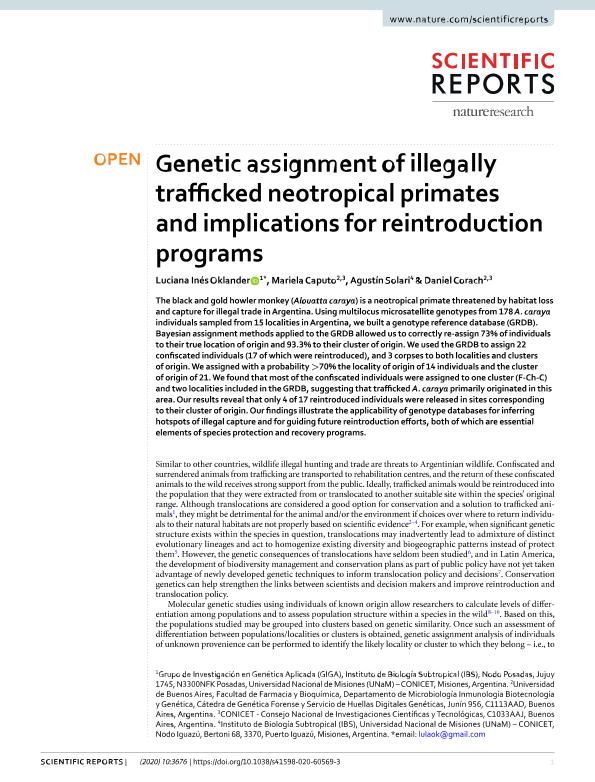Artículo
Genetic assignment of illegally trafficked neotropical primates and implications for reintroduction programs
Fecha de publicación:
02/2020
Editorial:
Nature Publishing Group
Revista:
Scientific Reports
ISSN:
2045-2322
e-ISSN:
2045-2322
Idioma:
Inglés
Tipo de recurso:
Artículo publicado
Clasificación temática:
Resumen
The black and gold howler monkey (Alouatta caraya) is a neotropical primate threatened by habitat loss and capture for illegal trade in Argentina. Using multilocus microsatellite genotypes from 178 A. caraya individuals sampled from 15 localities in Argentina, we built a genotype reference database (GRDB). Bayesian assignment methods applied to the GRDB allowed us to correctly re-assign 73% of individuals to their true location of origin and 93.3% to their cluster of origin. We used the GRDB to assign 22 confiscated individuals (17 of which were reintroduced), and 3 corpses to both localities and clusters of origin. We assigned with a probability >70% the locality of origin of 14 individuals and the cluster of origin of 21. We found that most of the confiscated individuals were assigned to one cluster (F-Ch-C) and two localities included in the GRDB, suggesting that trafficked A. caraya primarily originated in this area. Our results reveal that only 4 of 17 reintroduced individuals were released in sites corresponding to their cluster of origin. Our findings illustrate the applicability of genotype databases for inferring hotspots of illegal capture and for guiding future reintroduction efforts, both of which are essential elements of species protection and recovery programs.
Palabras clave:
GENOTYPE REFERENCE DATABASE
,
ALOUATTA CARAYA
,
REINTRODUCTION
,
ILLEGAL TRADE
Archivos asociados
Licencia
Identificadores
Colecciones
Articulos(IBS)
Articulos de INSTITUTO DE BIOLOGIA SUBTROPICAL
Articulos de INSTITUTO DE BIOLOGIA SUBTROPICAL
Citación
Oklander, Luciana Inés; Caputo, Mariela; Solari, Agustín; Corach, Daniel; Genetic assignment of illegally trafficked neotropical primates and implications for reintroduction programs; Nature Publishing Group; Scientific Reports; 10; 1; 2-2020; 1-9
Compartir
Altmétricas




